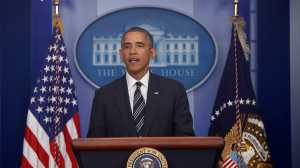President Barack Obama’s speech in Cairo in June of 2009 was meant to signal a “new beginning” in the relationship between the United States and the Muslim world. Unfortunately, in the intervening years since the famous speech there has been little to no qualitative change in a relationship that had aroused so much hope in its potential only a few years ago.
While there have certainly been some changes in the US foreign policy—most notably and recently, the Iranian nuclear negotiations—President Obama’s foreign policy has not yielded the results that were envisioned. The President’s interview with Thomas Friedman, regarding what Friedman terms the “Obama Doctrine,” offers great insight into why Obama’s approach to foreign policy has failed in the Middle East. Like every president before him, he entertains a fundamental misconception of the region and the people.
It is not the President’s proclamation of a foreign policy based upon the idea that “we will engage, but we preserve all our capabilities” that is problematic. Rather it is the incongruity between this commitment to engagement and his response to a question about what he would say to the Iranian people to gain their support for the nuclear deal. Obama replies, “For that matter, what I’d say to the Iranian people is: You don’t need to be anti-Semitic or anti-Israel or anti-Sunni to be a powerhouse in the region.”
Within this short sentence, President Obama reveals not only an abiding Orientalism that permeates his understanding of the Middle East and its people but also shows how the policy of engagement can be easily undermined by a fundamental lack of understanding of the realities of the region. He not only labels seventy million people living in Iran as anti-Semitic, anti-Israel, and anti-Sunni, but also reduces the population to one homogeneous mindless mass of people.
Obama says that he would tell the people of Iran that it is not necessary to be anti-Semitic to become a regional power. While the number of Jews in Iran has greatly diminished since the revolution in 1979, Iran has the largest Jewish population in the Middle East outside of Israel and also has functioning synagogues, kosher restaurants, and a designated seat for a Jewish representative in the Majles (parliament). When Obama says he wants to tell the Iranian people they don’t have to be anti-Semitic to be a regional power, he is also telling the Jews in Iran (who number in the tens of thousands) that they have no place in their own home. He is essentially “othering” Jews in Iran from the outside.
Obama also discounts the significant steps that have been taken by the Rouhani Administration to recognize the importance of Jewish Iranians to the country. The state recently announced that Jewish students would be allowed to take the Sabbath off from school. In recent years, there has also been a concerted effort to recognize the contributions of Jewish Iranians in the Iran-Iraq War. A memorial clearly marked with Hebrew and a picture of a menorah was erected and dedicated to the fallen Jewish soldiers in December 2014. The engagement with the Jewish population on an official governmental level in recent years suggests that there is a deliberate shift in Iranian policy.
With his wide-sweeping proclamation that the Iranian people are anti-Semitic because they want to be a regional power, President Obama ignores the experiences of the Jews of Iran and undermines the work of Jewish activists to gain more rights in a society in which they are a minority. The fact that the Jews living in Iran have stayed there voluntarily, despite the fact that they could easily make aliyah to Israel certainly means something. The fact that the Iranian government is beginning to make accommodations for its Jewish population must be acknowledged in order to better understand the domestic situation in the country.
President Obama also states that the Iranian people are anti-Sunni. According to the CIA Factbook, 5-10% of the Iranian population is Sunni. Already the assertion that the Iranian people are anti-Sunni is questionable. However, a brief look at history further undercuts the bigoted view of Iranians that Obama presents in his interview with Friedman.
The Iran-Iraq War in the 1980s saw a Sunni Saddam Hussein attacking a Shia Iran. If one were to adhere to the idea that the Iranians are anti-Sunni, the Sunni minority would be expected to fight alongside the Sunni-led Iraq. However, this was not the case. The Sunnis of Iran fought alongside their Shia countrymen while the Shia Iraqis fought alongside their Sunni countrymen.
There is no doubt that the Jewish and Sunni populations in Iran face discrimination and institutionalized restrictions. However, there is a significant difference between a government’s policies and the views held by its people. The discriminatory laws are not necessarily grounded in an innate dislike of Jewish or Sunni citizens—these are people who have lived peacefully alongside one another for centuries. Rather, there are political and historical considerations that inform the domestic and foreign policies of any country. Acknowledging and understanding these factors will only help President Obama in his stated intent to engage as a matter of policy.
As long as the policy-makers in Washington, D.C. continue to view the Middle East as an incomprehensible region with a people who are fundamentally different from the West, any policy or so-called doctrine will fail to yield results. While a policy of engagement seems to be constructive and positive on the surface, it is extremely dangerous when coupled with a lack of genuine understanding of a situation. A dialogue that is based upon erroneous and misinformed facts will only succeed in creating deeper tensions between the United States and other countries. A successful policy of engagement demands an end to the dehumanization of the Middle East and its people.
Written by Zahra Abbassi
